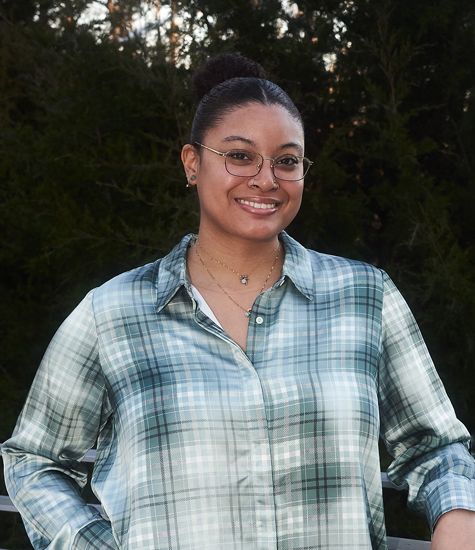Early Career Scientist Spotlight
Ms. Amethyst Barnes (she/her/hers)
Astrophysicist
Observational Cosmology Laboratory (665)
What motivated you to pursue a career in Astrophysics?
When I was a child, I was infatuated with the big and little dipper, also known as Ursa Major and Ursa Minor. There were many nights that I would go outside and look up at the sky in hopes that the South Florida skies would allow me to witness their wonder again. Then one year, the summer camp I attended visited a planetarium, and it has become one of the memories that always replays in my mind. I believe that’s where my love for space and all its inhabitants began. As I got older, I began painting space, my favorite celestial objects being galaxies and supernovae. I was drawn to how abstract and vibrant they are with their multitude of colors and hues. Once I got to high school, I took my first physics class and was surprised by how much I enjoyed it. I was always eager to learn more. I then discovered that I could study both physics and astronomy as one entity: astrophysics. At the very end of my junior year, I decided that I wanted to pursue a career in astrophysics. I didn’t have any representation shown to me of someone who looked like me and was in this career field. I went in completely blind of what a degree in astrophysics entailed, but I knew my passion for it would get me through it all, and it did.
How did you end up working at NASA Goddard?
In the summer of 2022, I attended the Black in Astro “Black in Space Week” virtual career fair, which I initially wasn’t going to attend because I was volunteering at a summer camp. One of my mentors urged me to join, so I did during a small gap of free time. I joined the NASA breakout room, where the Deputy Director of the ASD of NASA GSFC was the representative. I emailed her a few weeks later to follow up, and we had a virtual meeting to discuss internships and opportunities at NASA, and she sent my resume around to projects that were doing work with the topics I was interested in. A couple months later, I received an email from the Deputy Project Scientist for the Nancy Grace Roman Space Telescope concerning the possibility of me interning for the Roman’s Project Science Team. In summer of 2023, I had my first internship ever working at NASA Goddard Space Flight Center for the Roman Project Science Team. Towards the end of my internship, I expressed my desire to continue my work with Roman, as I had just graduated from the Florida Institute of Technology with my Bachelor of Science in Astronomy & Astrophysics and planned to take a gap year before going to graduate school. I was approved by the Project Scientist for Roman to continue my work as a Post-Baccalaureate Researcher and began my position in September 2023.
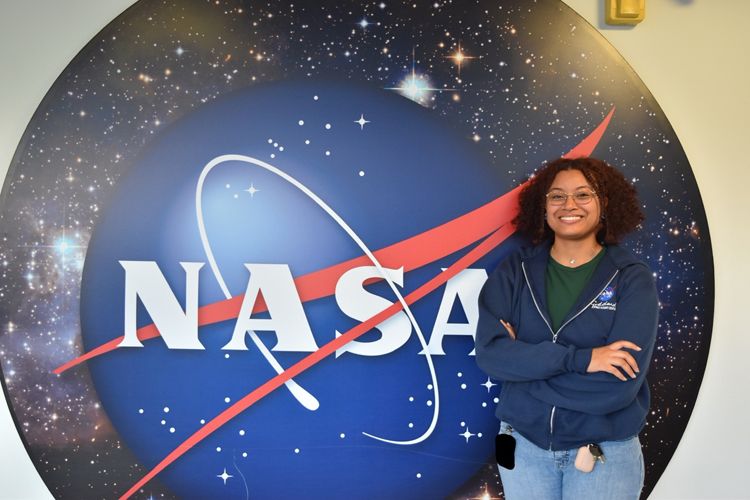
Credit: Emma Kleiner
What is one space mission that you are particularly excited about, and why?
Words cannot describe how excited I am about the launch of the Nancy Grace Roman Space Telescope. I discovered this mission at the beginning of my 4th year in undergrad when I was looking into projects that studied my research interests of dark matter and dark energy. I made it my own personal mission to work with their team one day. Roman is set to do marvelous things, including studying dark matter, dark energy, exoplanets, and general infrared astrophysics. What makes Roman so different from other telescopes is its wide field of view, spanning about 100 times that of the Hubble Space Telescope. We will be able to see so much more of the sky and uncover the many mysteries it holds.
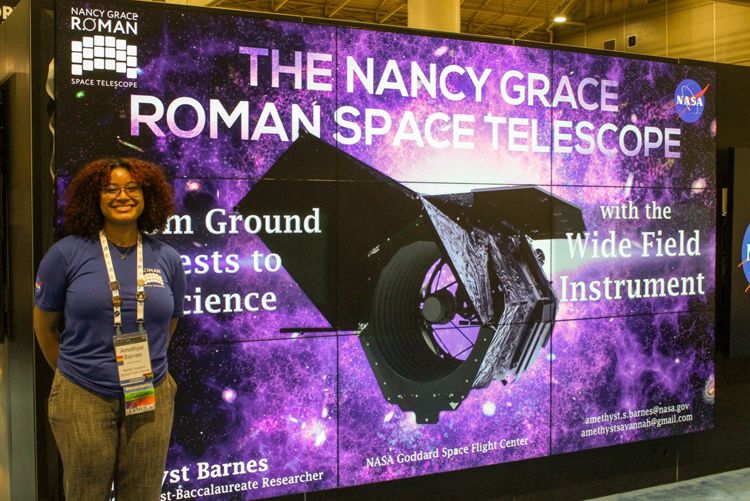
Credit: Yesenia Arroyo
What skills are most useful to you in your work, and where did you develop those skills?
The work I do is centered around simulations. More specifically, I work with modeling weak gravitational lensing in the Roman Space Telescope using JWST observed galaxies. The technical skills that I find most useful in my work include Python and many different Python packages/software, such as: Astropy, Matplotlib, GalSim (a real sky simulator), and WebbPSF (a JWST PSF simulator). I had an introduction to this language during my undergraduate degree, but I learned a lot of my current knowledge during my 2023 summer internship here at NASA GSFC. Other technical skills I find useful are knowing how to use database sites and reading through catalogues. I developed this skill during my undergraduate degree, as I had astrophysics classes that required me to look up celestial objects in sites such as SIMBAD and VizieR. As for reading through catalogues, I developed this skill during my post-baccalaureate position. In terms of soft skills, critical thinking and problem solving go hand-in-hand for my work. For example, I need to be able to 1) connect the dots on different aspects and be able to figure out how to pull from different topics and 2) effectively communicate to a broad audience. This is a skill that has become very useful, especially when giving talks and poster presentation on my research. Additionally, having optimism in this field is also important. If things seem like they’re not working out or your code isn’t working the way it should, it’s important to be optimistic and tell yourself to keep trying and not get too discouraged. It will work out in the end! I began developing these skills during the beginning of my undergraduate degree, and they are still being developed. This also goes for the technical skills. There is always room to learn and improve!
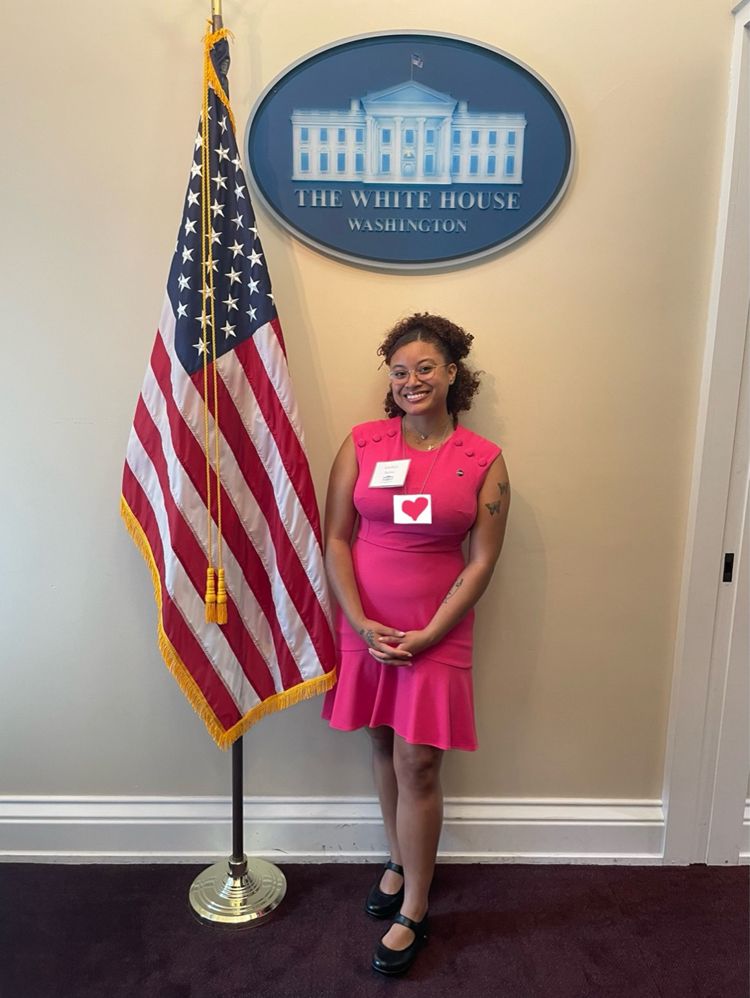
Credit: Jordan Forman
What are your future research interests and goals?
For the longest time, this question really stumped me. The complexity of the cosmos holds so many interesting and exciting topics that are so attractive to me! I was so focused on my academics and the now that I didn’t even really think about what I would want to do after getting my undergraduate degree. Doing this thinking made me stumble upon dark matter and dark energy. Seeing that they are truly the sculptors of our Universe, I have set out to be one of the writers of the next chapter of our knowledge of dark matter and dark energy. This being said, my future research interests are centered around conducting research on dark matter and dark energy to peel back their layers and see what they’re really made of. In my current career stage, I aim to continue applying to astrophysics graduate programs in hopes to receive my Ph.D. in Astrophysics to continue my journey towards this goal.
What is a fun fact about you?
I have quite a few hobbies that I love spending time doing! My main hobbies are cooking and baking. I come from a family of people who love to cook and bake, so it rubbed off on me! I also love painting and crafting. I recently added crocheting to my list of crafts, and I’m working on a blanket! Some other hobbies I enjoy are skateboarding, Lego building, singing, writing, and exploring! I am also a plant mom, so I love taking care of them.

Credit: Amethyst Barnes
Who inspires you?
My family truly inspire me to strive for greater and to be the best I can be. They are my biggest fans and supporters! As an Afro-Latina first-generation college graduate, whose parents are immigrants from Panama and Trinidad & Tobago, pursuing higher education and succeeding in a field where I am the minority is a generation dream. My parents did not have the opportunities that I have. I get my drive and passion from them and my older brother, as they are diligent and hard workers. When they put their minds to something, they give their all and do their best to do their work effectively and efficiently. I strive to be like them. They drive who I am and what I am today.
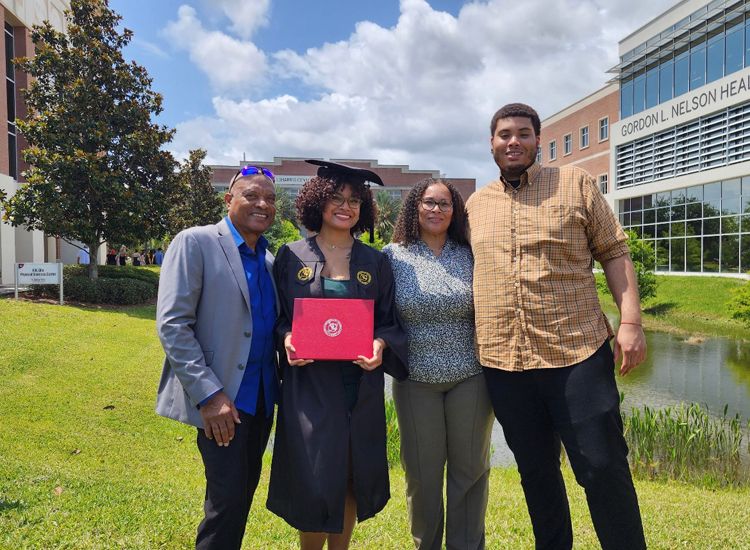
Credit: Serena DeCandia
Biography
Home Town:
Pembroke Pines, FL
Undergraduate Degree:
B.S. Astronomy & Astrophysics, Florida Institute of Technology, Melbourne, FL
